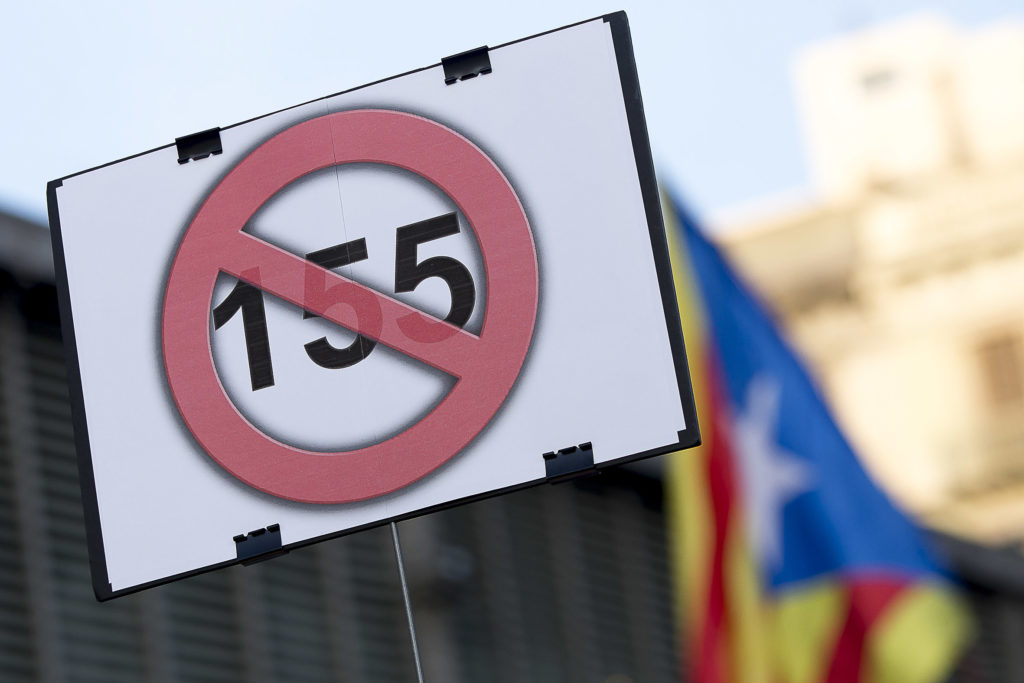19.06.2018 - 07:47
|
Actualització: 19.06.2018 - 09:47
One of Mariano Rajoy’s last actions as Spanish president before being ousted from office by a no-confidence motion was to approve Catalan president Quim Torra’s cabinet nominations. More than five months after the pro-independence bloc held on to its parliamentary majority in the December 21 election, during which every attempt to form a government was blocked by the Spanish authorities, Catalonia finally has a new executive. The most pressing consequence of this is the return to self-governance and the lifting of direct rule from Madrid.
Direct rule was imposed after a declaration of independence in the Catalan parliament on October 27. The mechanism used to suspend self-government was a section of the Spanish Constitution known as Article 155. In the run-up to the October 1 referendum on independence, the Rajoy government repeatedly threatened to trigger the “nuclear option” as the article became known. With independence declared, Rajoy was as good as his word and for the next seven months Catalonia’s affairs were run from Madrid.
When Torra took office as Catalan president he announced that one of his first acts in the post would be to set up an investigation into the effects of direct rule. In Catalonia, Article 155 has been seen as synonymous with the repression by the independence movement, and a main focus for protest, along with former Catalan government ministers being held in prison. But what shape is Catalonia in as direct rule is about to be lifted and the country attempts to once again stand on its own two feet under a new government?
In the seven months that direct rule lasted, the Rajoy government held 28 cabinet meetings, at which 249 measures for Catalonia were approved under the terms of Article 155. The Spanish executive focused mostly on day-to-day administrative matters and largely avoided any major political changes in running Catalonia’s affairs. However, some of the decisions taken by the government in Madrid proved highly unpopular in Catalonia, provoking widespread resentment and disapproval.
260 dismissed
Some 260 people lost their jobs while direct rule lasted, among them were high-ranking ministers and officials accused of collaborating with the secessionist push. Apart from the dismissal of the entire Catalan government, among some of the more prominent dismissals were the director general of foreign affairs, Marina Borrell, the Permanent Delegate of the Catalan Government to the EU, Amadeu Altafaj, the head of the Public Administration School, Agustí Colomines, and the head of the Institute of Public Security of Catalonia, Annabel Marcos. Catalan police chief, Josep Lluís Trapero, who attained hero status in Catalonia for his handling of the Barcelona terror attacks, was also removed from his post.
Closure of institutions
The government in Madrid wasted no time in closing down the Catalan government’s network of foreign offices, except for the one in Brussels. In the years leading up to the political crisis, the government had opened a number of delegations around the world to represent Catalonia’s interests in countries such as the US, Germany and the UK. Yet, Madrid repeatedly insisted that diplomatic representation was a power reserved for the Spanish government. The Public Diplomacy Council, which promoted Catalonia abroad, was also closed down.
Cancellation of projects
Numerous projects in many areas were also cancelled or put on hold during the months of direct rule. Some examples are the program to relocate refugees in Catalonia, the 2016-2019 welfare benefit program between the Catalan government and the Barcelona city council, worth some 52 million euros. A program to secure 235,000 flats for social housing was also put on hold, as were programs to help the LGBTI and under age sectors.
Forceful removal of works of art
One effect of direct rule that made a profound impression came in December, when a Spanish judge ordered the forceful removal of disputed works of art from Lleida Museum. Originally from the Sixena monastery, experts’ warnings about the potential damage to the Romanesque treasures were ignored as police accompanied the artworks back to Aragon. This was after a long-disputed conflict between the administrations in Catalonia and Aragon. The Catalan authorities had judicially fighted for the works to stay in the country for years, but with its government under Madrid control, no further legal dispute was carried out from Barcelona.
Working language in schools
A hugely controversial effect of Article 155 was the threat posed to Catalan as the working language in schools in Catalonia. The Spanish government revealed plans to offer parents an option on school enrolment forms that would ensure their children would receive 25% of their schooling in Spanish. After a widespread outcry, the plans were dropped.
Centralizing taxation plans on hold
In taking control of all of the Catalan government accounts, Madrid’s direct rule also cancelled the agreements to centralize taxation issues in Catalonia, while funding for various Catalan government projects were put on hold, such as the reform of legislation governing savings banks in Catalonia, or the chambers of commerce law.
Police prevented from new anti-terror measures
The Catalan police, the Mossos d’Esquadra, complain that direct rule has prevented the adoption of new anti-terror measures, while the force no longer has access to reserve funds used to finance anti-jihadi operations. The Mossos also say that a detailed list of all imams in Catalonia has not been provided as was promised.
Historical memory project halted
Reports by Servidors.cat association of public servants and the Ombudsman have condemned the suspension of payments to fund compensation owed to former political prisoners of the Franco regime. At the same time, the Catalan government’s project to open mass graves from the period has been cancelled.
Freezing of plan for park rangers
Direct rule has also seen the freezing of the strategic plan for park rangers, which includes a new regulation allowing them to carry weapons. This initiative was a consequence of the Aspa case, in which a hunter shot two park rangers dead.


